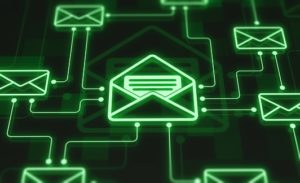

Can Encrypting Your Law Firm’s Emails Keep Them Safe From Cyber Thieves?
Email encryption is a great way to protect the contents of your emails from intruders. Once an email is encrypted, cyber crooks can no longer read the contents. It’s protected and you’ll need the encryption key to unlock and decrypt the files.
How Does Email Encryption Work?
Email encryption utilizes public-key cryptography. When you send an email, it’s encrypted by the computer using the public key. This transforms the email into complex, scrambled content that’s difficult to hack. Only someone with the proper corresponding private key can decrypt the email and read it.
How Do We Encrypt All Emails For Our Calgary Law Firm?
Because of the difficulties with encrypting emails, law firms and other businesses rely on their IT providers to perform this service using an automatic encryption service. Your staff won’t have to worry about encrypting individual emails because the service is set up to work automatically. Emails flow through a gateway appliance that’s configured to the law firm’s security policies.
Law firms typically send and receive a great deal of confidential information so email encryption just makes sense for them.
- The contents of an email are encrypted. Even if it’s intercepted it still can’t be read without a private key.
- Outsiders are prevented from intercepting incoming or outgoing emails that are transmitted between servers.
- Emails in storage are encrypted to prevent hackers from gaining access to their contents.
What Happens If We Do Not Use Email Encryption?
Emails that are not encrypted are vulnerable to cyber thieves. They’re searching for any information they can use to steal legal, proprietary or financial information from you. Often, emails include things like banking information, social security numbers, and log-in credentials. This info can be sold on the Dark Web. Important documents could be exposed or financial accounts could be breached.
Hackers will also have access to the attachments you send in emails, including private case/matter information. If you email contracts to clients or partners, this information could be exposed.
Is Transport Layer Security (TLS) Enough to Protect Our Emails?
TLS does provide a secure channel for data transmission. It also ensures that all content, emails, and attachments are encrypted during transit. This is referred to as Data-in-Motion Security.
However, TLS doesn’t provide security for data at rest (in storage). That means archived emails aren’t encrypted and are exposed to hackers. Sometimes the TLS connections are terminated before the emails arrive at their final destination. There’s no way to guarantee that TLS alone will protect the contents of your emails. This is why you should consider using an email encryption service.
What Are Email Encryption Services?
In the past, email encryption services were difficult to use. Both the sender and recipient had to exchange encryption keys before sending and receiving emails to one another. As a result, people didn’t want to take the time to do this, and employees simply ignored the firm’s policies. This led to breaches in security where sensitive, confidential data was exposed.
Today, email encryption services are simple, secure and cloud-based. Key management is automatic so it’s not burdensome to users or administrators. The first time a recipient receives an email, a unique key is generated. Emails (including attachments) are encrypted using the recipient’s key.
How Do You Use An Email Encryption Service?
After the process of encryption is complete, a separate notification email containing a link to log into a secure message center is sent to the recipient. It’s accessed via a web browser using HTTPS (certified for security).
Once the recipient logs in, their encrypted email messages are sent to them for viewing. At this point they can reply to the email or download it for archiving on their computer, knowing that emails are still encrypted and will be secure.
Where Are The Encryption Keys Stored?
The encryption keys are stored securely in a central location. And key management is automatic without any additional work for your employees.
These state-of-the-art data centers ensure the physical security of everything while strict access control guarantees that only authorized personnel will have access to the message center. For additional security, the data centers and the keys used to encrypt the data are stored in separate areas.
Canada Now Requires Data Breach Notification
The Canadian government now requires breach notifications be sent within a specified time frame. This recently published cabinet order states that beginning on November 1, 2018, the Digital Privacy Act requires businesses that experience a “breach of security safeguards” to notify affected individuals of the breach and any details that are pertinent. The Privacy Commissioner, along with other relevant organizations or government institutions must also be notified of the breach.
Looking For Email Encryption Services in the Calgary Area?
Rafiki Technologies provides Email Encryption Services to law firms in your area. Our cloud-based approach to email encryption ensures the security of your emails and attachments. We utilize an Advanced Encryption Service with a 256-bit cipher, commonly known as AES-256.
Rafiki Email Encryption Service provides cloud-based outbound email encryption, with multiple policies that allow administrators to specify precisely which outbound emails to encrypt. Emails that match the policies can then be sent securely (via TLS) to our message center.
For more information about our Email Encryption Services and how your law firm will benefit from them, contact the experts at Rafiki Technologies. We’re the Legal IT Solutions provider in Calgary, Alberta.
